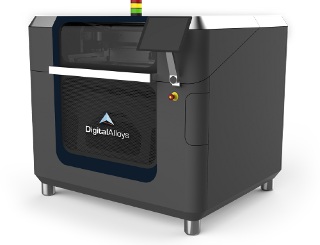 |
| August 14, 2018 | Volume 14 Issue 30 |
Designfax weekly eMagazine
Archives
Partners
Manufacturing Center
Product Spotlight
Modern Applications News
Metalworking Ideas For
Today's Job Shops
Tooling and Production
Strategies for large
metalworking plants
Boeing HorizonX Ventures invests in high-speed multi-material metal 3D-printing company Digital Alloys
Boeing announced on August 7 its investment in Digital Alloys, a Burlington, MA-based company developing high-speed, multi-metal additive manufacturing systems that produce 3D-printed parts for aerospace and other production applications. Other investors include Lincoln Electric, Khosla Ventures, and G20 Ventures
Digital Alloys' "Joule Printing" technology can rapidly combine multiple metals into each part, which enhances thermal, electrical, magnetic, and mechanical properties. The process allows metals like titanium and high-temperature alloys to be 3D printed for parts that could be used on Boeing products.

"Our investment in Digital Alloys will help Boeing produce metal structural aerospace parts faster and at higher volume than ever before," said Brian Schettler, managing director of Boeing HorizonX Ventures.
Formed in January 2017, Digital Alloys developed a patented 3D-printing approach that avoids the cost and complexity of powder-based systems and reportedly delivers higher resolution than other wire-based 3D-printing techniques.
Joule Printing was inspired by a few simple observations:
- Low production costs require both an inexpensive raw material and high printing speeds.
- Printing speed is gated by how quickly heat moves to the desired melting location.
- Metal 3D printers work by positioning and then melting raw material to build up 3D parts. For optimal speed, cost, and repeatability, the process should use as few steps as possible.
- Repeatable quality requires an ability to directly measure and control the melting process.
Joule Printing uses commodity wire as the raw material rather than expensive powders. It works with any metal in wire form. The technology is a radically simple, high-speed process for melting wire into useful shapes that works as follows:
- Rapid, precise motion and wire feed systems position the tip of the wire in contact with a desired printing (melting) location.
- Once the wire is positioned, the system pushes current through the wire and part being printed and into the print bed. The current melts the wire tip using joule heating (aka "resistance heating"), the same physics that heat a coil in a toaster.
- Melting and wire feed continue while the print head moves, laying down beads of metal that are fused together to form fully dense metal parts.
A key is that positioning and melting of the wire occur simultaneously in a single step. This radical simplicity lowers cost, saves time, and increases repeatability. There is no need for powder handling, feeding, and spreading; no need for binding/debinding; and no need for sintering -- and no need for the costs, time delays, and variability these steps introduce.
Joule Printing provides precise closed-loop control of melting at the voxel level. Since the wire is held in a precision motion system, the developers know exactly where the melt is deposited. Unlike a direct energy deposition system, there is no dripping or splashing.
Learn more at digitalalloys.com.
Additive manufacturing generates value for Boeing by reducing the cost and time needed to design, build, and deliver products to customers. Today, Boeing has more than 60,000 3D-printed parts flying on space, commercial, and defense products.
The Boeing HorizonX Ventures investment portfolio is made up of companies specializing in autonomous systems, energy and data storage, advanced materials, augmented reality systems and software, machine learning, hybrid-electric and hypersonic propulsion, and Internet of Things connectivity.
Source: Boeing
Published August 2018
Rate this article
View our terms of use and privacy policy
